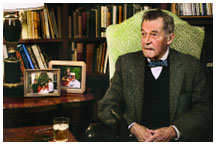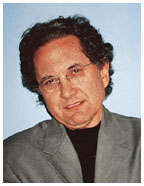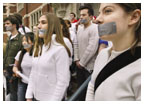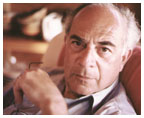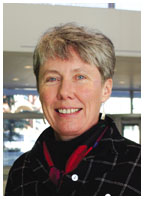Have an opinion about this issue of PAW? Please take a minute to click here and fill out our online questionnaire. It’s an easy way to let the editors know what you like and dislike, and how you think PAW might do better. (All responses will be kept anonymous.) |
April 20, 2005: Notebook
In his own words: Goheen’s years as president
Humbug? Nope. Poppycock? Nah.
BS? Yes!
At 75, professor becomes an overnight sensation
Robert Goheen ’40 *48, Princeton’s president from 1957 to 1972, looks back in newly videotaped interviews. (Denise Applewhite) |
In his own words: Goheen’s years as president
When the University was considering the admission of women as undergraduates in the late 1960s, President Robert Goheen ’40 *48 asked longtime trustee Harold Helm ’20 to lead a committee to examine the issue.
“Hal said, ‘But I don’t believe in it,’” Goheen recalled in a recent interview with University Archivist Dan Linke. “And I said, ‘Hal, I didn’t ask you to believe in it. I asked you to study it.’ And he picked up the ball and he did. He led that committee, and they thought and argued and considered hard.” In the end, the committee recommended the beginning of coeducation at Princeton in 1969.
The story is one of many from Goheen’s 15-year presidency that he shared with Linke in four hours of videotaped interviews, now available at the Seeley G. Mudd Manuscript Library. The recordings represent the library’s first oral history project devoted specifically to Princeton history. Linke hopes to add more recollections from former presidents and top administrators in the future.
Goheen, 85, lives in Princeton. His impact on the University is clearly visible, from the 25 buildings constructed during his time in office to the structure of University’s governance — both the Council of the Princeton University Community and the provost’s office were established during his tenure. The student body also changed significantly during Goheen’s presidency, with the admission of more black students and the addition of women. In the interviews, he spoke about those changes, as well as the tumultuous periods of protest on campus sparked by the war in Vietnam and the invasion of Cambodia.
Oral history is meant to record open and dispassionate reflections from key public figures, a goal that Linke said the Goheen project accomplished. M. Kathryn Taylor ’74, the director for special projects for the Alumni Council, served as the producer, and Linke was the interviewer, a role that he found surprisingly comfortable. “He just puts people at ease,” Linke said of Goheen. “He’s so unassuming. When you consider all the things he has done in his life, he’s really quite modest.”
A former classics professor, Goheen took over as president in 1957 at age 37, becoming the youngest Princeton president since the colonial period. His entrée to the position began with an informal discussion with friend Dean Mathey ’12 and about a dozen other trustees in 1956. “I told them quite candidly what I thought about Princeton, and what I thought the problems were, and what its tremendous potential was, and about individuals who I thought would be or not be good presidents,” Goheen said. It was not until days later that he realized he had become a candidate for the job.
Five years after he left the University in 1972, Goheen became the U.S. Ambassador to India, the country of his birth, and he served in that capacity for three years. But his time at Princeton remains the most significant period of his career. When asked about his legacy at the University, Goheen highlighted his administration’s mind-set.
“I was able to start a process of change at the University —
creative change — which has been carried forward by each one of
my successors,” he said. “I don’t know if that’s
a legacy or not, but anyhow it’s very gratifying to see that the
University’s not stopped.” ![]()
By B.T.
‘This is not Princeton’
After 30 students were arrested for blocking the front steps of the Princeton office of the Institute for Defense Analyses (IDA) in a protest of the Vietnam War in October 1967, PAW reported that President Robert Goheen ’40 *48 had said during the protest, “This is not Princeton.” In an interview for Mudd Library’s oral history project, he clarified that often-quoted remark.
The IDA had rented a building on University land, Goheen said, and some of its scientists worked closely with Princeton faculty. But the University had no formal ties to the group, other than being its landlord. “They [the students] were protesting against the University,” Goheen recalled. “The IDA was not the University.” So his statement — “This is not Princeton” — was meant to be literal.
Said Goheen: “I was astounded at the interpretation that it wasn’t the proper thing for Princetonians to do.”

Ricardo Piglia (PAW FILE Photo) |
An appeals court in Argentina ruled that Princeton Professor Ricardo Piglia and his publisher rigged a $50,000 literary prize so that Piglia’s true-crime novel Plata quemada won the 1997 Premio Planeta, one of Argentina’s best-known awards for unpublished fiction. Piglia and the publishing house are appealing the decision.
Piglia, one of Argentina’s premier novelists and literary critics, is the Walter S. Carpenter Professor of Language, Literature, and Civilization of Spain.
The publishing house Planeta sponsored the literary prize. Piglia signed a contract with an imprint of Planeta in 1994 to publish his collected works and two future works. In February, a panel of three appellate judges found that the contract violated the prize rule that entered works be “unpublished and not have given or promised publishing rights ... to a third party.” The judges said the prize jurors, who included several of Argentina’s top writers, were “predisposed or predetermined” to select Piglia. Plaintiff Gustavo Nielson, one of 10 finalists for the 1997 prize, was awarded $3,500 in damages, plus interest.
Piglia, who is on leave from the University for the 2004–05 year, declined several requests from PAW for comment. In a lengthy response March 13 in Página/12, a Buenos Aires newspaper, Piglia dismissed the idea of a rigged jury by pointing out he had presented his work under a pseudonym and a false title. “That the courts have wasted their time on a ridiculous literary quarrel seems to me a quaint sign of the times in which we live,” he wrote, invoking Kafka, Borges, and Henry James in his defense.
Eric Quiñones, a University spokesman, said Princeton would not comment on an ongoing lawsuit.
Plata quemada, which reconstructs a 1965 Argentinian bank robbery,
was translated as Money to Burn in 2003. ![]()
By Dan Grech ’99

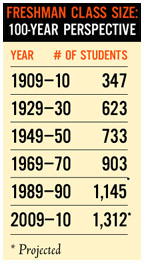 Princeton’s
plan to expand the number of undergraduates from 4,700 to 5,200 students
will begin this fall with the enrollment of 28 additional students in
the Class of 2009. The 2 percent increase in the size of the incoming
class marks the first phase in a seven-year period of gradual growth.
Princeton’s
plan to expand the number of undergraduates from 4,700 to 5,200 students
will begin this fall with the enrollment of 28 additional students in
the Class of 2009. The 2 percent increase in the size of the incoming
class marks the first phase in a seven-year period of gradual growth.
The trustee executive committee approved the revised plan in February, paving the way for classes of 1,226 students to be admitted in 2005 and 2006. That number will increase by 50 students for 2007. In 2009, Princeton will begin admitting 1,312 students per year, its projected “steady-state level,” the University said, reaching its target of 5,200 students in the fall of 2012.
Dormitory construction played a role in the feasibility of adding undergraduates earlier than the fall of 2007, the previously announced start of expansion. The completion last summer of Bloomberg Hall (formerly known as the ellipse dorm) increased the available living space on campus, and President Tilghman said she was confident that the University had “the necessary academic, campus life, and administrative resources” to accommodate the larger classes. Whitman College, the University’s sixth residential college, is scheduled to open in 2007, but Butler College will be undergoing renovation in 2007 and 2008, delaying the fully expanded classes by two years.
Plans for the growth in the undergraduate population were recommended in 2000 by the Wythes Committee, a group of trustees appointed to study the future of Princeton’s student body, facilities, and financial resources. Adding undergraduates, the committee reported, would strengthen the overall quality of the University, boost the proportion of undergraduates in the overall student population, and make better use of the University’s resources.
The Wythes Committee projected 5,100 students in the undergraduate classes;
that number has been increased, in part because of the rise in the number
of undergraduates pursuing a semester abroad. The on-campus undergraduate
population is still expected to be 5,100, the University said. ![]()
By B.T.

(Frank Wojciechowski) |
About 30 students marched across campus March 18 to mark the second
anniversary of a Cuban crackdown on pro-democracy activists. The students’
mouths were taped with the names of jailed dissidents. The protest was
sponsored by the Cuban-American Undergraduate Student Association, a new
campus organization.![]()

Humbug?
Nope. Poppycock? Nah. BS? Yes!
At 75, professor becomes an overnight sensation
Professor emeritus Harry G. Frankfurt’s 1986 essay is now a best-selling book. (Princeton University Press ) |
Harry G. Frankfurt, professor of philosophy emeritus, became a sudden media celebrity at 75 with the February publication of his 67-page book, On Bullshit. The book, which had an initial printing of 5,000 copies by Princeton University Press, sold more than 110,000 copies in a month, and Frankfurt was interviewed for 60 Minutes, The Daily Show with Jon Stewart, and numerous radio stations and newspapers.
Frankfurt, a moral philosopher who lives in Princeton, first wrote what became his “little book” as an essay for the Fall 1986 issue of the Raritan quarterly. He was chairman of the philosophy department at Yale at the time, coming to Princeton in 1990. Frankfurt received a “small stream” of responses through the years, which led the University Press to suggest publishing the essay as a small book.
Frankfurt begins his book by stating that while his subject is “one of the most salient features of our culture,” we have no theory of what it is or what functions it serves. He describes how it is different from lying. (It is a lack of concern for describing reality correctly, as opposed to lying, which is the deliberate making of false claims.) “By virtue of this,” Frankfurt says, “bullshit is a greater enemy of the truth than lies are.”
Frankfurt spoke with PAW’s managing editor, Ray Ollwerther ’71:
Did you intend this book as a serious work or more tongue in cheek?
It was not written tongue in cheek, although I understand it’s almost inevitable that there will be a certain titillation about the spectacle of an Ivy League professor writing about this kind of subject. But the fact is that I intended it to be a serious piece of philosophical analysis.
What’s behind the book’s success — and how did you choose the title?
People are sick of bullshit; they’re starved for truth, they’re starved for straight talk, for somebody who will come in and tell things the way they really are. ... I didn’t choose the title to be provocative especially, but just to tell the truth about what the book is about.
Do we all fall into this at some time or other?
I think that circumstances do put us in situations where we are almost inevitably going to find ourselves indulging in bullshit. Any time a person is called upon or required or feels obliged or feels moved for any reason to talk about something he really doesn’t know much about — if he keeps on talking beyond the point at which his knowledge runs out, there’s going to be bullshit.
Is this a serious problem in our society?
To the extent that people’s respect for the truth and concern for the truth is being weakened and eroded, I think that it is a serious thing. ... [O]ur attitude toward it tends to be rather benign. One consideration of that may be that people tend to think that they can detect bullshit pretty readily, so it doesn’t strike them as being so much of a threat as lies are. Lies can be difficult to detect.
What’s been the reaction of your colleagues?
They profess to be very pleased for me. ... One of my colleagues at the time [I wrote this] said, This is just what analytic philosophers are supposed to do — they’re supposed to take important concepts that are not fully understood and analyze them, try to figure out what they really mean, what’s really going on when we use them. I was very encouraged by that remark, and I hope that my colleagues share that view.
As you talk to the media, do you ever feel you could be straying toward what your book warns about?
I’m afraid I do feel that way from time to time. I can hear myself
repeating myself ... and what I say has less and less substance as we
go on and [is] more and more a matter of hot air. ![]()
For a video interview with Frankfurt, go to www.pupress.princeton.edu/video/frankfurt/.

(Craig Terry) |
“Computers and video games are seen as boy toys. And boys can be incredibly aggressive in monopolizing access to computers at school and at home. ... Females grow to believe they don’t belong in computer science and won’t be good at it.”
Maria Klawe, dean of Princeton’s School of Engineering and Applied
Science, speaking March 23 at Butler College on “Gender, Lies and
Video Games: The Truth About Females and Computing.” She said computer
science is the only area of science and engineering in which participation
by women has decreased in the past 25 years. ![]()

Grozny, August 2000: Russian soldiers destroyed books from Grozny's university in front of the students (Photo by Stanley Greene) |
“CIVILIZING WAR” is the theme of a photography exhibition in Robertson Hall’s Bernstein Gallery that runs through May 13. Gary Bass, assistant professor of politics and international affairs, said the photos “are reminders both of the reality of war and of the precariousness of efforts to restrain it” through protocols like the Geneva Conventions; curator Kate Somers said the exhibition includes “some very difficult images.” A related panel discussion will take place Thursday, April 21, at 4:30 p.m. in Dodds Auditorium, Robertson Hall. Participating will be Anne-Marie Slaughter ’80, dean of the Woodrow Wilson School; Roy Gutman, Pulitzer Prize-winning international affairs writer for Newsday; and Bass. The gallery is open 9 a.m. to 7 p.m. weekdays.
Britton Keeshan, a Middlebury College senior, will discuss his experiences “SCALING THE SEVEN SUMMITS” on Saturday, April 23, at 8 p.m. in McCosh 10. Keeshan became the youngest person to successfully climb the Seven Summits when he scaled Mount Everest in May 2004. His talk, sponsored by the Outdoor Action Program, includes a slide show.
PAUL TAYLOR, a noted figure in modern dance for 50 years, will be interviewed on stage at the James Stewart Theater in 185 Nassau on Friday, April 29. Taylor will discuss the evolution of dance in the last half of the century as well as his own choreography. Video of some of Taylor’s more than 90 dances will be shown. The program begins at 4:30 p.m.
DAVID J. GROSS, winner of the 2004 Nobel Prize in physics, will discuss
25 questions that might guide physics over the next 25 years in a talk
Friday, April 29. Gross, director of the Kavli Institute For Theoretical
Physics at the University of California, Santa Barbara, shared the prize
with Frank Wilczek *75 of MIT and H. David Politzer of Caltech. Gross
was a professor at Princeton and Wilczek was a graduate student when they
completed the calculation that helped understand the structure of the
nucleus. Gross’ talk begins at 8 p.m. in A-02 McDonnell Hall.
![]()

STEVEN VEACH |
Knowledge pays
Differences in education-related job qualifications play a significant role in how much American workers are paid. But do employees from certain races get higher returns from their schooling? Probably not, according to Cecilia Elena Rouse, professor of economics and public affairs, and Lisa Barrow *99 of the Federal Reserve Bank of Chicago. Using data from three national surveys, the authors report in a recent paper that the return on education is relatively constant across racial and ethnic groups. The research supports the idea that increasing the education levels of less-skilled workers would boost economic well-being and reduce income inequality, regardless of race.
Family ties
Good partners make good parents, according to a recent paper by Sara
McLanahan, professor of sociology and public affairs, and Marcia Carlson
of Columbia University. Using data from the Fragile Families and Child
Wellbeing Study, the authors found links between quality of the mother-father
relationship and the quality of parenting in families with both married
and unmarried parents. Married couples reported more supportive relationships
with less frequent conflict compared with their unmarried counterparts,
supporting the idea that policy initiatives to improve relationship skills
and bolster marriage could benefit parents, and in turn their children.
Addressing the roles of both parents is critical, the authors write. Programs
for improving parenting have typically focused on the interaction between
mother and child, but based on their research, McLanahan and Carlson say
the father-child relationship is just as important. ![]()

On March 31, Princeton mailed admission offers to 1,214 regular-decision applicants for the CLASS OF 2009. Including early-admission students, 10.9 percent of the 16,516 applicants were accepted. Forty-one percent of the admitted students are from minority back- grounds, up from 35 percent a year ago, and 9.9 percent are children of alumni.
JAMES WILLIAMS ’06, a Woodrow Wilson School major
from Portland, Ore., has received the Harry S. Truman Scholarship Foundation
award. The award provides juniors interested in public service with $30,000
for graduate school. REBECCA JONES ’05, a psychology
major from New Canaan, Conn., and AMANDA DENNIS ’03
of Merion, Pa., have won Gates scholarships to Cambridge University. Jones
plans to research how children with high-functioning autism process emotions
from faces as she pursues a master’s in biological science. Dennis
is studying for a master’s degree in European literature and culture.
![]()


